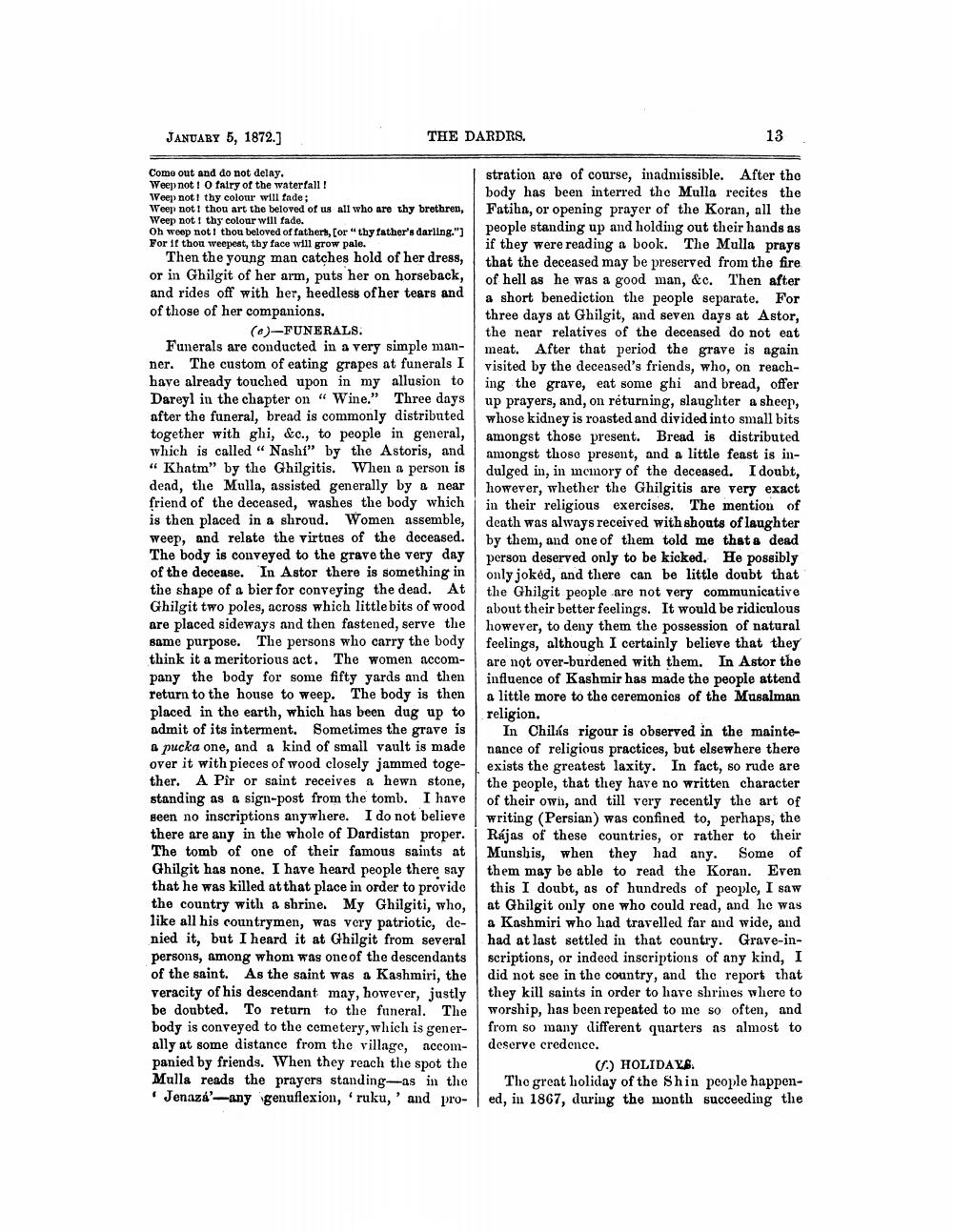________________
JANUARY 5, 1872.]
THE DARDRS.
13
Como out and do not delay.
stration are of course, inadmissible. After the Weep not ! O fairy of the waterfall!
body has been interred the Mulla recites the Weep not thy colour will fade; Weep not thou art the beloved of us all who are thy brethren, Fatiha, or opening prayer of the Koran, all the Weep not ! thy colour will fade. Oh weep not I thou beloved of fathers, (or "thy father's darling.")
people standing up and holding out their hands as For 11 thou weepeat, thy face will grow pale.
if they were reading a book. The Mulla prays Then the young man catches hold of her dress,
that the deceased may be preserved from the fire or in Ghilgit of her arm, puts her on horseback,
of hell as he was a good man, &c. Then after and rides off with her, heedless of her tears and
a short benediction the people separate. For of those of her companions.
three days at Ghilgit, and seven days at Astor, ()-FUNERALS.
the near relatives of the deceased do not eat Funerals are conducted in a very simple man- meat. After that period the grave is again ner. The custom of eating grapes at funerals I visited by the deceased's friends, who, on reachhave already touched upon in my allusion to ing the grave, eat some ghi and bread, offer Dareyl in the chapter on “ Wine." Three days up prayers, and, on returning, slaughter a sheep, after the funeral, bread is commonly distributed whose kidney is roasted and divided into small bits together with ghi, &c., to people in general, amongst those present. Bread is distributed which is called “Nashi" by the Astoris, and amongst thoso present, and a little feast is in"Khatm" by the Ghilgitis. When a person is dulged in, in memory of the deceased. I doubt, dend, the Mulla, assisted generally by a near however, whether the Ghilgitis are very exact friend of the deceased, washes the body which in their religious exercises. The mention of is then placed in a shroud. Women assemble,
death was always received with shouts of laughter weep, and relate the virtues of the deceased. by them, and one of them told me that a dead The body is conveyed to the grave the very day person deserved only to be kicked. He possibly of the decease. In Astor there is something in only jokéd, and there can be little doubt that the shape of a bier for conveying the dead. At the Ghilgit people are not very communicative Ghilgit two poles, across which little bits of wood about their better feelings. It would be ridiculous are placed sideways and then fastened, serve the however, to deny them the possession of natural Bame purpose. The persons who carry the body feelings, although I certainly believe that they think it a meritorious act. The women accom- are not over-burdened with them. In Astor the pany the body for some fifty yards and then influence of Kashmir has made the people attend return to the house to weep. The body is then a little more to the ceremonies of the Musalman placed in the earth, which has been dug up to religion, admit of its interment. Sometimes the grave is In Chilás rigour is observed in the mainte
pucka one, and a kind of small vault is made nance of religious practices, but elsewhere there over it with pieces of wood closely jammed toge- exists the greatest laxity. In fact, so rude are ther. A Pir or saint receives a hewn stone, the people, that they have no written character standing as a sign-post from the tomb. I have of their own, and till very recently the art of Been no inscriptions anywhere. I do not believe writing (Persian) was confined to, perhaps, the there are any in the whole of Dardistan proper. i Rájas of these countries, or rather to their The tomb of one of their famous saints at Munshis, when they had any. Some of Ghilgit has none. I have heard people there say them may be able to read the Koran. Even that he was killed at that place in order to provide this I doubt, as of hundreds of people, I saw the country with a shrine. My Ghilgiti, who, at Ghilgit only one who could read, and he was like all his countrymen, was very patriotic, de- a Kashmiri who had travelled far and wide, and nied it, but I heard it at Ghilgit from several had at last settled in that country. Grave-inpersons, among whom was one of the descendants scriptions, or indeed inscriptions of any kind, I of the saint. As the saint was a Kashmiri, the did not see in the country, and the report that veracity of his descendant may, howerer, justly they kill saints in order to have shrines where to be doubted. To return to the funeral. The worship, has been repeated to me so often, and body is conveyed to the cemetery, which is gener- from so many different quarters as almost to ally at some distance from the village, accom- deserve credence. panied by friends. When they reach the spot the
(.) HOLIDAY6. Mulla reads the prayers standing--as in the The great holiday of the Shin people happen
Jenaza'-any genuflexion, ruku,' and pro- ed, in 1867, during the month succeeding the




